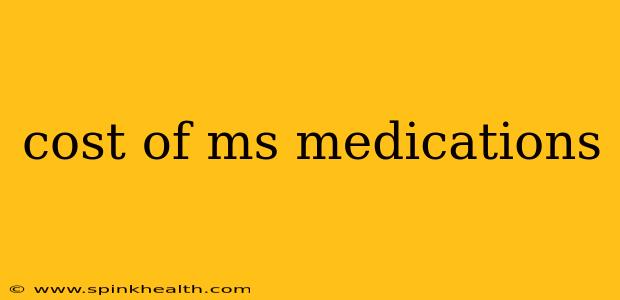The High Cost of Multiple Sclerosis (MS) Medications: A Journey Through Treatment and Affordability
Multiple sclerosis (MS) is a chronic, unpredictable autoimmune disease affecting the central nervous system. While there's no cure, advancements in MS medications have dramatically improved the lives of many individuals. However, a significant hurdle for many patients and their families is the often-prohibitively high cost of these life-altering treatments. This isn't just about dollars and cents; it's about access to vital medication that can significantly impact quality of life, impacting everything from mobility to cognitive function. This exploration delves into the complexities of MS medication costs, exploring the factors contributing to the expense and examining potential avenues for managing these substantial financial burdens.
What factors contribute to the high cost of MS drugs?
Several interwoven factors contribute to the sky-high prices of MS medications. Imagine a complex tapestry, with each thread representing a different piece of the puzzle. Research and development is a major thread; bringing a new drug to market requires years of rigorous testing and clinical trials, involving substantial investment. The pharmaceutical companies need to recoup these enormous costs, which are often passed on to patients. Another thread is the patent protection afforded to these innovative medications. This exclusivity allows pharmaceutical companies to set prices without direct competition for a specific period, further influencing cost. Finally, the complexity of manufacturing and distribution adds to the overall expense. These medications are often highly specialized, requiring specialized manufacturing processes and stringent quality control measures.
What are the different types of MS medications, and how do their costs vary?
The world of MS medications is diverse, with options categorized into different treatment classes. These include disease-modifying therapies (DMTs), which aim to slow the progression of the disease, and symptomatic treatments that address specific symptoms like muscle spasms or fatigue. Costs vary considerably depending on the type of drug, its method of administration (oral, injection, infusion), and the individual's specific needs and response to treatment. Some newer medications, particularly those with novel mechanisms of action, tend to be more expensive than older, established treatments. This highlights the ongoing tension between the promise of more effective therapies and the economic realities faced by patients.
How can I afford expensive MS medications?
Navigating the financial landscape of MS treatment can feel overwhelming, but there are pathways to help manage these costs. Firstly, thorough discussions with your neurologist are vital. They can help determine the most effective and cost-effective treatment plan for your specific situation, weighing the benefits of different medications against their costs. Insurance coverage is another critical aspect; understanding your insurance policy, including formularies and co-pay assistance programs, is crucial. Many pharmaceutical companies offer patient assistance programs (PAPs) that provide financial support to eligible patients. These programs can significantly reduce out-of-pocket costs. Exploring options like Medicare, Medicaid, or other state-funded programs might also lead to financial relief.
Are there cheaper alternatives to expensive MS drugs?
While newer medications often offer improved efficacy, there are often older, generic versions of some MS medications that are significantly more affordable. Consulting your neurologist to discuss these options is essential. They can help you weigh the potential benefits and risks of each option and determine whether a less expensive alternative would be suitable for your individual circumstances. It's a balancing act, weighing cost against potential efficacy. Remember, the right medication is crucial, but financial feasibility is just as important for long-term adherence to treatment.
What are the long-term costs associated with MS?
The financial burden of MS extends far beyond the cost of medications. Think of the ripple effect: managing symptoms often requires additional therapies like physical therapy, occupational therapy, and speech therapy, all of which add to the overall cost. The need for specialized equipment, such as mobility aids, can further strain resources. Lost income due to disability and the costs associated with managing chronic illness create additional financial challenges. These hidden costs highlight the importance of comprehensive financial planning and support systems for individuals and families impacted by MS.
The high cost of MS medications is a complex issue with far-reaching consequences. It's a journey of balancing advancements in treatment with the financial realities faced by patients. By understanding the factors contributing to the expense and exploring available resources, we can navigate this challenge and help ensure that all individuals living with MS have access to the treatment they need.

